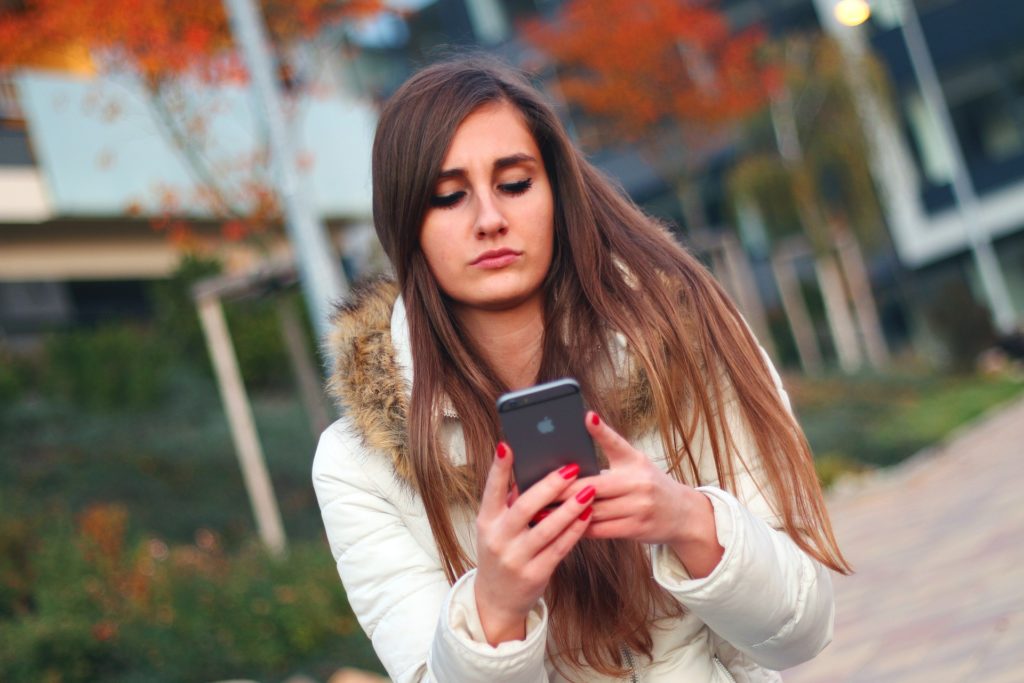- Calls to this hotline are currently being directed to Within Health, Fay or Eating Disorder Solutions
- Representatives are standing by 24/7 to help answer your questions
- All calls are confidential and HIPAA compliant
- There is no obligation or cost to call
- Eating Disorder Hope does not receive any commissions or fees dependent upon which provider you select
- Additional treatment providers are located on our directory or samhsa.gov
Is Video-Chatting Amidst COVID-19 Decreasing Self-Image?

Amidst the whirlwind of changes that have become our “new normal” since the COVID-19 outbreak, the increase in video-chatting is one of the biggest changes worldwide.
In mid-March 2020, Google searches for the term “video chat” spiked worldwide, and searches for terms such as “games to play over video chat” increased +700% [1].
Now, more than ever before, people are engaging in employment, schooling, socializing, and a number of other daily activities from behind a screen. We are looking at ourselves each other all day, every day, and this undoubtedly is impacting our self-view and the thoughts we have related to our appearance.
Researchers wanted to look into this impact to learn more about how constantly being faced with our appearance and voices over a screen is impacting our identity.
Technology and Appearance Satisfaction
It has been clear that social media and technology impact self-image even before COVID forced almost everyone to increase their engagement in these areas.
Studies have made it clear that “social media plays a role in the development and maintenance of appearance concerns in females” and that “time spent on social media is related to body dissatisfaction and disordered eating [2].” Going a step further, virtual video and photo-based social media sites and apps “are linked to body dissatisfaction and eating pathology [2].”
These mediums increase the tendency of individuals to engage in appearance-related comparison and to feel invalidated and insufficient. Appearance-related comparisons are proven to result in “greater body image concerns and increased facial dissatisfaction [2].” Among other problems, this can result in increased symptoms of anxiety, depression, and eating disorders.
In fact, some believe that video-chatting “may even cause greater risk for appearance concerns, including that it may be required rather than voluntary, it allows for real‐time viewing of oneself, and it has features that encourage the simultaneous comparison of one’s appearance to others [2].”
Video-Chatting During COVID
 The study mentioned above attempted to learn more about how the increased exposure to video platforms due to COVID-19 is impacting people’s appearance satisfaction and self-view. Participants were 438 women from the United States between the ages of 18 to 70.
The study mentioned above attempted to learn more about how the increased exposure to video platforms due to COVID-19 is impacting people’s appearance satisfaction and self-view. Participants were 438 women from the United States between the ages of 18 to 70.
These women “completed measures examining their use of video-chatting services, self‐objectification, video-chatting appearance comparison, and appearance satisfaction [2].”
Study facilitators hypothesized that higher engagement would result in lower appearance satisfaction. Surprisingly, they did not find evidence to support their hypothesis.
What they did find was that “daily video-chatting hours were unassociated with appearance satisfaction, which aligns with some work that suggests the specific social media activities, rather than the total time spent using it, predicts body dissatisfaction [2].”
Additionally, “daily video-chatting hours were not associated with self‐objectification or video-chatting appearance comparisons [2].” Even so, the amount to which individuals engaged in appearance comparisons and self-objectification over video chat did give insight.
Those who engaged in more appearance comparison or self-objectification reported lower face and body satisfaction [2]. The study also revealed that those that use Zoom features such as the “touch up my appearance” feature engaged in more appearance comparison [2].
A final interesting note is that those that video chatted most with their families reported greater body and face satisfaction [2]. Ultimately, study results show us that appearance satisfaction and self-view are not cut-and-dry and involve many different changing factors as the world changes.
Resources:
[1] Bika, N. (2020). Why the moment for video chat for business is now. Acquire, retrieved from https://acquire.io/blog/video-chat-for-business-during-pandemic/ [2] Pfund, G. N., Hill, P. L., Harriger, J. (2020). Video chatting and appearance satisfaction during COVID-19: appearance comparisons and self-objectification as moderators. International Journal of Eating Disorders.About the Author:
 Margot Rittenhouse, MS, PLPC, NCC is a therapist who is passionate about providing mental health support to all in need and has worked with clients with substance abuse issues, eating disorders, domestic violence victims, and offenders, and severely mentally ill youth.
Margot Rittenhouse, MS, PLPC, NCC is a therapist who is passionate about providing mental health support to all in need and has worked with clients with substance abuse issues, eating disorders, domestic violence victims, and offenders, and severely mentally ill youth.
As a freelance writer for Eating Disorder Hope and Addiction Hope and a mentor with MentorConnect, Margot is a passionate eating disorder advocate, committed to de-stigmatizing these illnesses while showing support for those struggling through mentoring, writing, and volunteering. Margot has a Master’s of Science in Clinical Mental Health Counseling from Johns Hopkins University.
The opinions and views of our guest contributors are shared to provide a broad perspective on eating disorders. These are not necessarily the views of Eating Disorder Hope, but an effort to offer a discussion of various issues by different concerned individuals.
We at Eating Disorder Hope understand that eating disorders result from a combination of environmental and genetic factors. If you or a loved one are suffering from an eating disorder, please know that there is hope for you, and seek immediate professional help.
Published October 30, 2020, on EatingDisorderHope.com
Reviewed & Approved on October 30, 2020, by Jacquelyn Ekern MS, LPC

The EatingDisorderHope.com editorial team comprises experienced writers, editors, and medical reviewers specializing in eating disorders, treatment, and mental and behavioral health.

